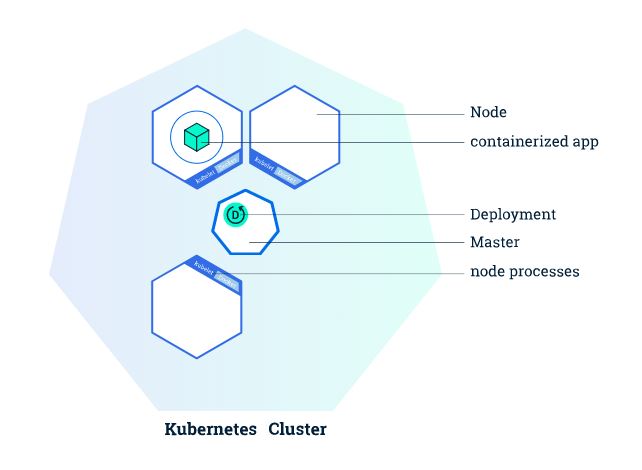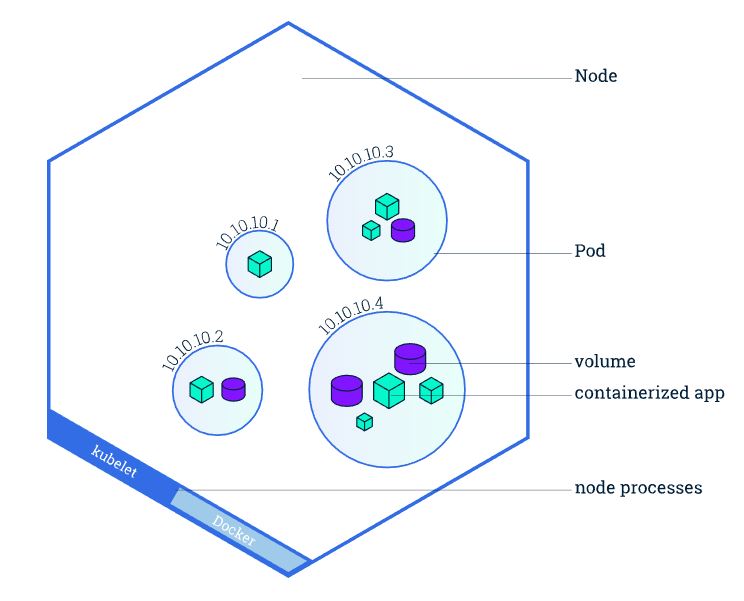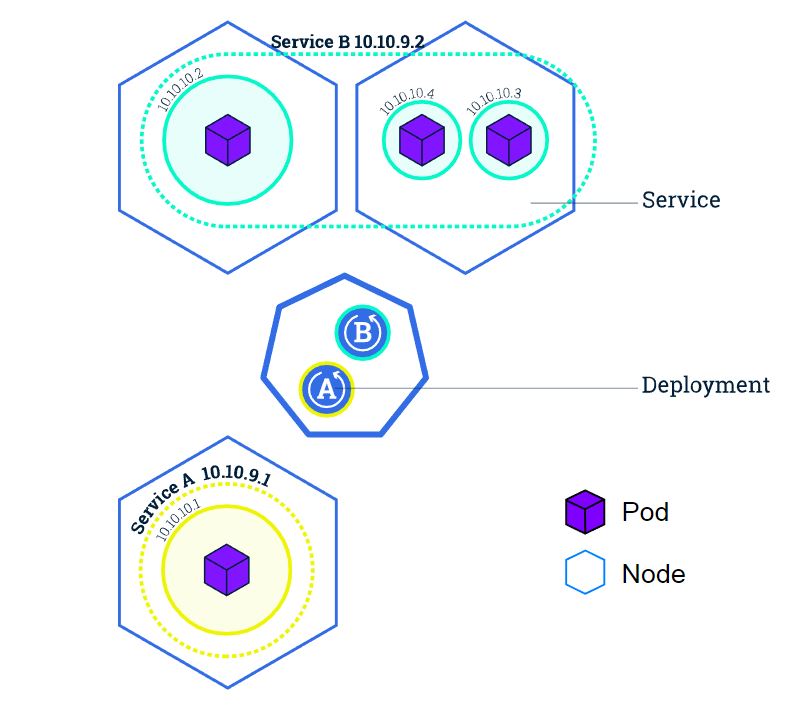minikube setup
How to setup minikube on portabledevops, please refer previous post.
Assume minikube and kubectl install and run properly,
$ which minikube /C/oldhorse/portableapps/dockertoolbox/minikube $ which kubectl /C/oldhorse/portableapps/dockertoolbox/kubectl
cluster
check version
minikube version
kubectl version
$ minikube version
minikube version: v0.24.1
$ kubectl version
Client Version: version.Info{Major:"1", Minor:"8", GitVersion:"v1.8.0", GitCommit:"6e937839ac04a38cac63e6a7a306c5d035fe7b0a", GitTreeState:"clean", BuildDate:"2017-09-28T22:57:57Z", GoVersion:"go1.8.3", Compiler:"gc", Platform:"windows/amd64"}
Server Version: version.Info{Major:"1", Minor:"8", GitVersion:"v1.8.0", GitCommit:"0b9efaeb34a2fc51ff8e4d34ad9bc6375459c4a4", GitTreeState:"clean", BuildDate:"2017-11-29T22:43:34Z", GoVersion:"go1.9.1", Compiler:"gc", Platform:"linux/amd64"}
start cluster
$ minikube start Starting local Kubernetes v1.8.0 cluster... Starting VM... Getting VM IP address... Moving files into cluster... Setting up certs... Connecting to cluster... Setting up kubeconfig... Starting cluster components... Kubectl is now configured to use the cluster. Loading cached images from config file. $ kubectl cluster-info Kubernetes master is running at https://192.168.99.100:8443 To further debug and diagnose cluster problems, use 'kubectl cluster-info dump'. $ kubectl get nodes NAME STATUS ROLES AGE VERSION minikube Ready 19h v1.8.0
deploy app
- self-healing mechanism to address machine failure or maintenance, if node down or deleted, controller will replace it
- need to specify the container image for your app and number of replicas running
deploy app "kubernetes-bootcamp" using docker image,
$ kubectl run kubernetes-bootcamp --image=docker.io/jocatalin/kubernetes-bootcamp:v1 --port=8080 deployment "kubernetes-bootcamp" created
check pod status,
$ kubectl get pods NAME READY STATUS RESTARTS AGE kubernetes-bootcamp-6db74b9f76-jvtkp 1/1 Running 0 14s $ kubectl get deployment NAME DESIRED CURRENT UP-TO-DATE AVAILABLE AGE kubernetes-bootcamp 1 1 1 1 22s
get more details about pod and container,
$ kubectl describe pods
Name: kubernetes-bootcamp-6db74b9f76-jvtkp
Namespace: default
Node: minikube/192.168.99.100
Start Time: Sun, 10 Dec 2017 08:27:50 -0500
Labels: pod-template-hash=2863065932
run=kubernetes-bootcamp
Annotations: kubernetes.io/created-by={"kind":"SerializedReference","apiVersion":"v1","reference":{"kind":"ReplicaSet","namespace":"default","name":"kubernetes-bootcamp-6db74b9f76","uid":"eb4a5d41-ddad-11e7-8d2b-0...
Status: Running
IP: 172.17.0.2
Created By: ReplicaSet/kubernetes-bootcamp-6db74b9f76
Controlled By: ReplicaSet/kubernetes-bootcamp-6db74b9f76
Containers:
kubernetes-bootcamp:
Container ID: docker://76d8fb9084d70d27fccd1dd2e43a311ab6c86f75fa91de36e8c1c1ab20e07b5d
Image: docker.io/jocatalin/kubernetes-bootcamp:v1
Image ID: docker-pullable://jocatalin/kubernetes-bootcamp@sha256:0d6b8ee63bb57c5f5b6156f446b3bc3b3c143d233037f3a2f00e279c8fcc64af
Port: 8080/TCP
State: Running
Started: Sun, 10 Dec 2017 08:28:02 -0500
Ready: True
Restart Count: 0
Environment:
Mounts:
/var/run/secrets/kubernetes.io/serviceaccount from default-token-8fqgm (ro)
Conditions:
Type Status
Initialized True
Ready True
PodScheduled True
Volumes:
default-token-8fqgm:
Type: Secret (a volume populated by a Secret)
SecretName: default-token-8fqgm
Optional: false
QoS Class: BestEffort
Node-Selectors:
Tolerations:
Events:
Type Reason Age From Message
---- ------ ---- ---- -------
Normal Scheduled 18m default-scheduler Successfully assigned kubernetes-bootcamp-6db74b9f76-jvtkp to minikube
Normal SuccessfulMountVolume 18m kubelet, minikube MountVolume.SetUp succeeded for volume "default-token-8fqgm"
Normal Pulling 18m kubelet, minikube pulling image "docker.io/jocatalin/kubernetes-bootcamp:v1"
Normal Pulled 18m kubelet, minikube Successfully pulled image "docker.io/jocatalin/kubernetes-bootcamp:v1"
Normal Created 18m kubelet, minikube Created container
Normal Started 18m kubelet, minikube Started container
explore app
Pods that are running inside Kubernetes are running on a private, isolated network. By default they are visible from other pods and services within the same kubernetes cluster, but not outside that network.
You can open 2nd shell terminal, running a proxy to forward communications into cluster-wide, private network. It can be stopped only by ctrl-C, no printout when it is running.
$ kubectl proxy Starting to serve on 127.0.0.1:8001
then you can access to APIs through proxy endpoint at http://localhost:8001.
query version from 1st shell terminal,
$ curl http://localhost:8001/version
{
"major": "1",
"minor": "8",
"gitVersion": "v1.8.0",
"gitCommit": "0b9efaeb34a2fc51ff8e4d34ad9bc6375459c4a4",
"gitTreeState": "clean",
"buildDate": "2017-11-29T22:43:34Z",
"goVersion": "go1.9.1",
"compiler": "gc",
"platform": "linux/amd64"
}
export POD_NAME to env,
$ export POD_NAME=$(kubectl get pods -o go-template --template '{{range.items}}{{.metadata.name}}{{"\n"}}{{end}}')
$ echo Name of the Pod: $POD_NAME
Name of the Pod: kubernetes-bootcamp-6db74b9f76-jvtkp
access to api of pod,
$ curl http://localhost:8001/api/v1/proxy/namespaces/default/pods/$POD_NAME/ Hello Kubernetes bootcamp! | Running on: kubernetes-bootcamp-6db74b9f76-jvtkp | v=1
check logs of pod
$ kubectl logs $POD_NAME Kubernetes Bootcamp App Started At: 2017-12-10T13:28:02.757Z | Running On: kubernetes-bootcamp-6db74b9f76-jvtkp Running On: kubernetes-bootcamp-6db74b9f76-jvtkp | Total Requests: 1 | App Uptime: 583.754 seconds | Log Time: 2017-12-10T13:37:46.511Z Running On: kubernetes-bootcamp-6db74b9f76-jvtkp | Total Requests: 2 | App Uptime: 587.405 seconds | Log Time: 2017-12-10T13:37:50.162Z
when pod is running, can directly run command on containers,
$ kubectl exec $POD_NAME env PATH=/usr/local/sbin:/usr/local/bin:/usr/sbin:/usr/bin:/sbin:/bin HOSTNAME=kubernetes-bootcamp-6db74b9f76-jvtkp KUBERNETES_PORT_443_TCP=tcp://10.96.0.1:443 KUBERNETES_PORT_443_TCP_PROTO=tcp KUBERNETES_PORT_443_TCP_PORT=443 KUBERNETES_PORT_443_TCP_ADDR=10.96.0.1 KUBERNETES_SERVICE_HOST=10.96.0.1 KUBERNETES_SERVICE_PORT=443 KUBERNETES_SERVICE_PORT_HTTPS=443 KUBERNETES_PORT=tcp://10.96.0.1:443 NPM_CONFIG_LOGLEVEL=info NODE_VERSION=6.3.1 HOME=/root
we can go to container,
$ kubectl exec -ti $POD_NAME bash root@kubernetes-bootcamp-6db74b9f76-jvtkp:/# cat server.js root@kubernetes-bootcamp-6db74b9f76-jvtkp:/# curl localhost:8080 Hello Kubernetes bootcamp! | Running on: kubernetes-bootcamp-6db74b9f76-jvtkp | v=1
expose app
kubernetes uses service to expose app, there are few type of ways:
- ClusterIp(default), service only reachable from within cluster
- NodePort, expose service using NAT, make a service accessible from outside the cluster using NodeIp:NodePort
- Loadbalancer, assign external ip to service
- ExternalName, exposes the service using an arbitrary name, need v1.7 + or kube-dns
we expose new service called kubernetes-bootcamp on $NodePort,
$ kubectl get pods NAME READY STATUS RESTARTS AGE kubernetes-bootcamp-6db74b9f76-jvtkp 1/1 Running 0 38m $ kubectl expose deployment/kubernetes-bootcamp --type="NodePort" --port 8080 service "kubernetes-bootcamp" exposed $ kubectl get services NAME TYPE CLUSTER-IP EXTERNAL-IP PORT(S) AGE kubernetes ClusterIP 10.96.0.1 443/TCP 42m kubernetes-bootcamp NodePort 10.105.210.176 8080:31251/TCP 4s
check which port opened externally,
$ kubectl describe services/kubernetes-bootcamp Name: kubernetes-bootcamp Namespace: default Labels: run=kubernetes-bootcamp Annotations: Selector: run=kubernetes-bootcamp Type: NodePort IP: 10.105.210.176 Port: 8080/TCP TargetPort: 8080/TCP NodePort: 31251/TCP Endpoints: 172.17.0.2:8080 Session Affinity: None External Traffic Policy: Cluster Events:
export $NODE_PORT to env,
$ export NODE_PORT=$(kubectl get services/kubernetes-bootcamp -o go-template='{{(index .spec.ports 0).nodePort}}')
$ echo NODE_PORT=$NODE_PORT
NODE_PORT=31251
test app is exposed outside of cluster, in our case we run minikube on win msys and minikube running in virtualbox, so node ip is vm host ip.
$ minikube ip 192.168.99.100 $ curl 192.168.99.100:$NODE_PORT Hello Kubernetes bootcamp! | Running on: kubernetes-bootcamp-6db74b9f76-jvtkp | v=1
label
check the label:
Labels: run=kubernetes-bootcamp $ kubectl describe deployment Name: kubernetes-bootcamp Namespace: default CreationTimestamp: Sun, 10 Dec 2017 08:27:50 -0500 Labels: run=kubernetes-bootcamp Annotations: deployment.kubernetes.io/revision=1 Selector: run=kubernetes-bootcamp Replicas: 1 desired | 1 updated | 1 total | 1 available | 0 unavailable StrategyType: RollingUpdate MinReadySeconds: 0 RollingUpdateStrategy: 1 max unavailable, 1 max surge Pod Template: Labels: run=kubernetes-bootcamp Containers: kubernetes-bootcamp: Image: docker.io/jocatalin/kubernetes-bootcamp:v1 Port: 8080/TCP Environment: Mounts: Volumes: Conditions: Type Status Reason ---- ------ ------ Available True MinimumReplicasAvailable OldReplicaSets: NewReplicaSet: kubernetes-bootcamp-6db74b9f76 (1/1 replicas created) Events:
use label to list pod,
$ kubectl get pods -l run=kubernetes-bootcamp NAME READY STATUS RESTARTS AGE kubernetes-bootcamp-6db74b9f76-jvtkp 1/1 Running 0 1h
same for service,
$ kubectl get services -l run=kubernetes-bootcamp NAME TYPE CLUSTER-IP EXTERNAL-IP PORT(S) AGE kubernetes-bootcamp NodePort 10.105.210.176 8080:31251/TCP 35m
export POD_NAME to env,
$ export POD_NAME=$(kubectl get pods -o go-template --template '{{range .items}}{{.metadata.name}}{{"\n"}}{{end}}')
$ echo Name of the Pod: $POD_NAME
Name of the Pod: kubernetes-bootcamp-6db74b9f76-jvtkp
change label,
$ kubectl label pod $POD_NAME app=v1 pod "kubernetes-bootcamp-6db74b9f76-jvtkp" labeled
we can see label changed,
$ kubectl describe pods $POD_NAME Name: kubernetes-bootcamp-6db74b9f76-jvtkp Namespace: default Node: minikube/192.168.99.100 Start Time: Sun, 10 Dec 2017 08:27:50 -0500 Labels: app=v1 pod-template-hash=2863065932 run=kubernetes-bootcamp
we can use new label,
$ kubectl get pods -l app=v1 NAME READY STATUS RESTARTS AGE kubernetes-bootcamp-6db74b9f76-jvtkp 1/1 Running 0 1h
scale app
- new Pods are created and scheduled to Nodes with available resource
- will distribute the traffic to multi instances
- can do rolling updates without downtime
$ kubectl scale deployments/kubernetes-bootcamp --replicas=4 deployment "kubernetes-bootcamp" scaled
$ kubectl get deployments
NAME DESIRED CURRENT UP-TO-DATE AVAILABLE AGE
kubernetes-bootcamp 4 4 4 4 1h
we have 4 pods running now,
$ kubectl get pods -o wide NAME READY STATUS RESTARTS AGE IP NODE kubernetes-bootcamp-6db74b9f76-cv8cj 1/1 Running 0 1m 172.17.0.7 minikube kubernetes-bootcamp-6db74b9f76-jvtkp 1/1 Running 0 1h 172.17.0.2 minikube kubernetes-bootcamp-6db74b9f76-lfqmk 1/1 Running 0 1m 172.17.0.4 minikube kubernetes-bootcamp-6db74b9f76-w4269 1/1 Running 0 1m 172.17.0.5 minikube
let’s see more details about scaled deployments,
$ kubectl describe deployments/kubernetes-bootcamp Name: kubernetes-bootcamp Namespace: default CreationTimestamp: Sun, 10 Dec 2017 08:27:50 -0500 Labels: run=kubernetes-bootcamp Annotations: deployment.kubernetes.io/revision=1 Selector: run=kubernetes-bootcamp Replicas: 4 desired | 4 updated | 4 total | 4 available | 0 unavailable StrategyType: RollingUpdate MinReadySeconds: 0 RollingUpdateStrategy: 1 max unavailable, 1 max surge Pod Template: Labels: run=kubernetes-bootcamp Containers: kubernetes-bootcamp: Image: docker.io/jocatalin/kubernetes-bootcamp:v1 Port: 8080/TCP Environment: Mounts: Volumes: Conditions: Type Status Reason ---- ------ ------ Available True MinimumReplicasAvailable OldReplicaSets: NewReplicaSet: kubernetes-bootcamp-6db74b9f76 (4/4 replicas created) Events: Type Reason Age From Message ---- ------ ---- ---- ------- Normal ScalingReplicaSet 3m deployment-controller Scaled up replica set kubernetes-bootcamp-6db74b9f76 to 4
load balance
check exposed ip and port,
$ kubectl describe services/kubernetes-bootcamp Name: kubernetes-bootcamp Namespace: default Labels: run=kubernetes-bootcamp Annotations: Selector: run=kubernetes-bootcamp Type: NodePort IP: 10.105.210.176 Port: 8080/TCP TargetPort: 8080/TCP NodePort: 31251/TCP Endpoints: 172.17.0.2:8080,172.17.0.4:8080,172.17.0.5:8080 + 1 more... Session Affinity: None External Traffic Policy: Cluster Events:
we need to export NODE_PORT to env,
$ export NODE_PORT=$(kubectl get services/kubernetes-bootcamp -o go-template='{{(index .spec.ports 0).nodePort}}')
$ echo NODE_PORT=$NODE_PORT
NODE_PORT=31251
then we can query app from exposed ip and node port.
In my case I run minikube from win7 msys64 so exposed ip is vm ip here,
$ minikube ip 192.168.99.100 $ curl 192.168.99.100:$NODE_PORT Hello Kubernetes bootcamp! | Running on: kubernetes-bootcamp-6db74b9f76-jvtkp | v=1 $ curl 192.168.99.100:$NODE_PORT Hello Kubernetes bootcamp! | Running on: kubernetes-bootcamp-6db74b9f76-lfqmk | v=1
you will see pod name changed means load balancing working.
scale down
$ kubectl scale deployments/kubernetes-bootcamp --replicas=2 deployment "kubernetes-bootcamp" scaled $ kubectl get deployments NAME DESIRED CURRENT UP-TO-DATE AVAILABLE AGE kubernetes-bootcamp 2 2 2 2 1h $ kubectl get pods -o wide NAME READY STATUS RESTARTS AGE IP NODE kubernetes-bootcamp-6db74b9f76-cv8cj 0/1 Terminating 0 7m minikube kubernetes-bootcamp-6db74b9f76-jvtkp 1/1 Running 0 1h 172.17.0.2 minikube kubernetes-bootcamp-6db74b9f76-lfqmk 1/1 Running 0 7m 172.17.0.4 minikube kubernetes-bootcamp-6db74b9f76-w4269 0/1 Terminating 0 7m minikube $ kubectl get pods -o wide NAME READY STATUS RESTARTS AGE IP NODE kubernetes-bootcamp-6db74b9f76-jvtkp 1/1 Running 0 1h 172.17.0.2 minikube kubernetes-bootcamp-6db74b9f76-lfqmk 1/1 Running 0 8m 172.17.0.4 minikube
rolling updates
- allow Deployments’ update to take place with zero downtime by incrementally updating Pods instances with new ones
- promote an application from one environment to another
- rollback to previous versions
- CI(Continuous Integration) and CD(Continuous Delivery) of applications with zero downtime
as test, we change image version to v2,
$ kubectl set image deployments/kubernetes-bootcamp kubernetes-bootcamp=jocatalin/kubernetes-bootcamp:v2 deployment "kubernetes-bootcamp" image updated
check NodePort,
$ kubectl describe services/kubernetes-bootcamp | grep -i nodeport Type: NodePort NodePort: 31251/TCP
verify the exposed ip and port, check pod name and image version,
$ curl 192.168.99.100:$NODE_PORT Hello Kubernetes bootcamp! | Running on: kubernetes-bootcamp-6566f8f9db-j4rvx | v=2 $ curl 192.168.99.100:$NODE_PORT Hello Kubernetes bootcamp! | Running on: kubernetes-bootcamp-6566f8f9db-lbl22 | v=2 $ curl 192.168.99.100:$NODE_PORT Hello Kubernetes bootcamp! | Running on: kubernetes-bootcamp-6566f8f9db-lbl22 | v=2 $ curl 192.168.99.100:$NODE_PORT Hello Kubernetes bootcamp! | Running on: kubernetes-bootcamp-6566f8f9db-mhj6m | v=2 $ curl 192.168.99.100:$NODE_PORT Hello Kubernetes bootcamp! | Running on: kubernetes-bootcamp-6566f8f9db-xqcnf | v=2
check rollout status,
$ kubectl rollout status deployments/kubernetes-bootcamp deployment "kubernetes-bootcamp" successfully rolled out
rollback
let’s change to image v10 which is not exist in repository,
$ kubectl set image deployments/kubernetes-bootcamp kubernetes-bootcamp=jocatalin/kubernetes-bootcamp:v10 deployment "kubernetes-bootcamp" image updated
from below check will find v10 not exist and pods get to wrong status,
kubectl get deployments kubectl get pods kubectl describe pods Failed to pull image "jocatalin/kubernetes-bootcamp:v10": rpc error: code = Unknown desc = Error response from daemon: manifest for jocatalin/kubernetes-bootcamp:v10 not found
we can quickly rollback the update by,
$ kubectl rollout undo deployments/kubernetes-bootcamp deployment "kubernetes-bootcamp" rolled back $ kubectl get pods NAME READY STATUS RESTARTS AGE kubernetes-bootcamp-5466c44897-x5fgp 0/1 Terminating 0 8m kubernetes-bootcamp-6566f8f9db-j4rvx 1/1 Running 0 18m kubernetes-bootcamp-6566f8f9db-lbl22 1/1 Running 0 16m kubernetes-bootcamp-6566f8f9db-mhj6m 1/1 Running 0 18m kubernetes-bootcamp-6566f8f9db-nj44l 1/1 Running 0 4s $ kubectl get pods NAME READY STATUS RESTARTS AGE kubernetes-bootcamp-6566f8f9db-j4rvx 1/1 Running 0 18m kubernetes-bootcamp-6566f8f9db-lbl22 1/1 Running 0 16m kubernetes-bootcamp-6566f8f9db-mhj6m 1/1 Running 0 18m kubernetes-bootcamp-6566f8f9db-nj44l 1/1 Running 0 10s



